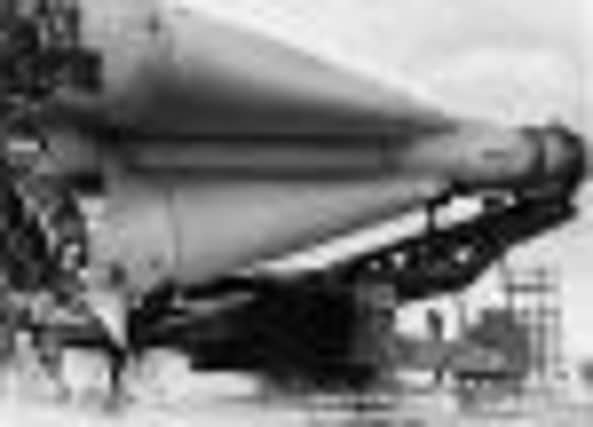Gagarin’s great journey... after they had fixed the hatch


On April 12, 1961, shortly after 9am Moscow time, Yuri Gagarin heard the words: “We wish you a good flight. Everything is all right.”
The young air force pilot replied “Poyekhali” (Russian for “off we go”) and strapped inside a tiny metal capsule he began a new chapter in mankind’s journey of exploration.
Advertisement
Hide AdAdvertisement
Hide AdBy the time he had ejected from Vostock 1 and parachuted safely back to earth he had become the first human in space, securing his place in the history books for centuries to come.
News of the world’s first manned orbital flight was beamed around the globe with the Soviet Union eager to bask in the international glory of Gagarin’s historic achievement. It was a landmark not only of the 20th century, but mankind’s history.
Astronomer and writer Dr Heather Couper agrees it was a momentous occasion. “In 1957 they launched the Sputnik and then that poor little dog Laika was sent into space and suddenly four years later we sent a man up there travelling at 25,000 miles an hour, it was amazing. In 1961, a lot of people had not even been in an aeroplane and yet we had sent somebody into space.”
What is remarkable is this epoch-making flight came just 58 years after the Wright brothers had first taken to the skies in their rickety aircraft.
Advertisement
Hide AdAdvertisement
Hide AdAs Dr Couper says, it inflamed people’s imaginations. “It was fantastically significant, it made young people all over the world look to the heavens and it led to man going to the moon and future space explorations.”
However, newly declassified documents show that the Russian cosmonaut’s maiden journey into space was beset by last-minute problems.
“It was more dangerous than everybody thought it was. The door wouldn’t shut properly on his capsule and engineers had to put in new rivets.”
Scientists also attempted to reduce the weight of Gagarin’s spacesuit but in their haste disconnected two gauges which caused a short circuit that had to be fixed on the eve of the voyage. What should have been a 90 minute journey ended up being 108 minutes.
Advertisement
Hide AdAdvertisement
Hide Ad“He ended up in a much higher orbit, he should have reached 143 miles above the earth but instead he went up to 203 miles which made it much more dangerous,” says Dr Couper.
“It was a very risky flight but President Khrushchev wanted to show the Americans that Russia had supremacy in space so they took risks with young Gagarin, who was only 27 at the time.”
Gagarin was chosen to man the spacecraft as much for his size as for his prowess as a pilot. “He went up in a very small capsule which was little more than a ‘tin can’, although it was a reinforced tin can. But Gagarin was only 5ft 2in tall and the Russians used him because he was the only bloke who could fit in the capsule.”
Gagarin’s brave accomplishment meant he found himself a global celebrity who was feted wherever he went – he received a hero’s welcome when he visited Britain later that year.
Advertisement
Hide AdAdvertisement
Hide AdBut although his place in the annals of history was secure, his career as a cosmonaut wasn’t. “The Russians stopped him from going back into space because they wanted him as an ambassador and according to his daughter he was upset by this because he wanted to go up in space again,” says Dr Couper.
Another reason the Kremlin perhaps didn’t want him going back into orbit was the fact that space exploration was in its infancy and as a result incredibly dangerous. The irony is that he remained a test pilot and died in a mysterious plane crash in 1968.
Through Gagarin, the Soviet Union made its own giant leap for mankind, but its lead in the Space Race was short lived and it spurred a humiliated America to up the ante.
Within a month, Alan Shephard became the first American in space and eight years later the US won the race to put a man on the moon.
Advertisement
Hide AdAdvertisement
Hide AdBut none of this diminishes what the young Russian cosmonaut did. “It didn’t only pave he way for future man and unmanned space flights it led to developments and breakthroughs in many other fields. At the beginning of aviation when the Wright brothers flew for the first time I wonder if people had any idea where it would lead to, not just in terms of flying, but what it would enable us to do, and it’s the same with space.”
Half a century since we first put a man into orbit, space exploration remains our greatest adventure and when Yuri Gagarin slipped the surly bonds of earth he started mankind on a journey the end of which is almost impossible to imagine.